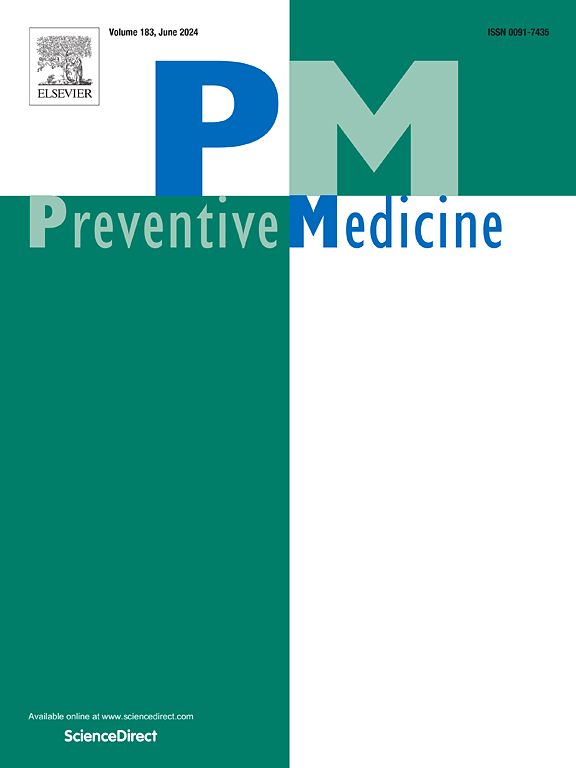Association between midlife intake of ultra-processed foods and later-life subjective cognitive complaints: Evidence from the new York University women's health study
IF 3.2
2区 医学
Q1 MEDICINE, GENERAL & INTERNAL
引用次数: 0
Abstract
Objective
Research into risk factors for subjective cognitive complaints (SCCs) may offer insight into the etiology and prevention of Alzheimer's disease. Ultra-processed foods (UPFs) contain food additives that improve palatability and processed raw materials. Evidence is limited on the role of mid-life UPF intake in the development of late-life SCCs.
Methods
We included 5119 participants who responded to the 2018 or 2020 follow-up of the New York University Women's Health Study, a prospective cohort of 14,274 women recruited in New York City, United States, in 1985–91. Data on diet were collected at baseline using a validated modified Block food frequency questionnaire. Energy-adjusted total intake of UPFs and subgroups of UPFs, defined following the nova guidelines, were estimated using the residual method.
Results
The odds ratios (ORs) and 95 % confidence intervals (CIs) for reporting ≥2 SCCs were 1.15 (0.94–1.39), 1.06 (0.87–1.30), 1.20 (0.99–1.46), and 1.24 (1.02–1.51) for women in the 2nd, 3rd, 4th, and 5th quintiles of energy-adjusted UPF intake, respectively, compared to those in the bottom quintile (p-trend = 0.02). The associations were similar in sensitivity analyses using Multiple Imputation and Inverse Probability Weighting to account for potential selection bias.
Conclusions
Higher UPF intakes in midlife were associated with higher odds of late-life SCCs in women.
中年摄入超加工食品与晚年主观认知抱怨之间的关系:来自纽约大学妇女健康研究的证据
目的研究主观认知主诉(SCCs)的危险因素,为阿尔茨海默病的病因和预防提供新的思路。超加工食品(upf)含有食品添加剂,可改善适口性和加工原料。关于中年UPF摄入在晚期SCCs发展中的作用的证据有限。方法:我们纳入了5119名参与者,他们对纽约大学女性健康研究的2018年或2020年随访做出了回应,这是一个1985-91年在美国纽约市招募的14274名女性的前瞻性队列。饮食数据在基线时使用经过验证的改良Block食物频率问卷收集。根据nova指南定义的upf和upf亚组的能量调整总摄入量使用残差法进行估计。结果能量调节UPF摄入第二、三、四、五分位数女性报告≥2个SCCs的优势比(ORs)和95%可信区间(ci)分别为1.15(0.94-1.39)、1.06(0.87-1.30)、1.20(0.99-1.46)和1.24(1.02-1.51),与最低五分位数女性相比(p趋势= 0.02)。在使用多重输入和逆概率加权来解释潜在的选择偏差的敏感性分析中,这些关联是相似的。结论较高的UPF摄入量与女性晚年SCCs的发生率相关。
本文章由计算机程序翻译,如有差异,请以英文原文为准。
求助全文
约1分钟内获得全文
求助全文
来源期刊

Preventive medicine
医学-公共卫生、环境卫生与职业卫生
CiteScore
7.70
自引率
3.90%
发文量
0
审稿时长
42 days
期刊介绍:
Founded in 1972 by Ernst Wynder, Preventive Medicine is an international scholarly journal that provides prompt publication of original articles on the science and practice of disease prevention, health promotion, and public health policymaking. Preventive Medicine aims to reward innovation. It will favor insightful observational studies, thoughtful explorations of health data, unsuspected new angles for existing hypotheses, robust randomized controlled trials, and impartial systematic reviews. Preventive Medicine''s ultimate goal is to publish research that will have an impact on the work of practitioners of disease prevention and health promotion, as well as of related disciplines.
 求助内容:
求助内容: 应助结果提醒方式:
应助结果提醒方式:


